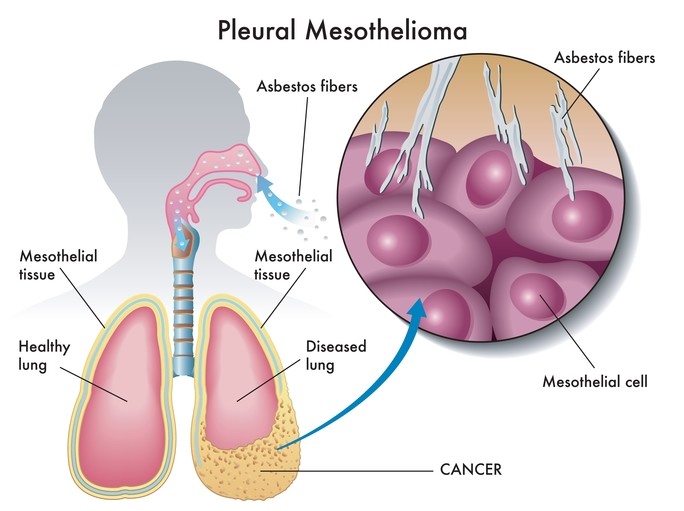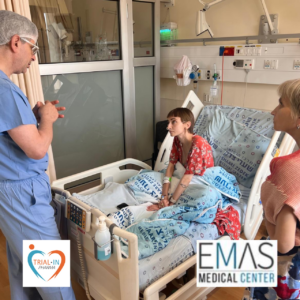Home » Mesothelioma
Mesothelioma

About Mesothelioma
Mesothelioma cancer develops in the lungs for many years and considered a violent cancer.
The disease develops in the thin membrane called mesothelium surrounding the lungs, chest and abdominal cavity.
The lungs are a double respiratory organ with a sponge-like texture and shaped like a cone in the chest. The lungs provide the body with oxygen and remove carbon dioxide from the body in the process of breathing.
For most patients with stage 4 metastatic Mesothelioma cancer, current treatments are insufficiently effective. This gives rise to the need for innovative strategies with greater efficacy in fighting the disease.
The National Cancer Institute, NCI, highlights the fact that for a certain group of mesothelioma patients, the best treatment option is to join one of the many clinical trials existing worldwide aiming to increase their chances of therapeutic success.
Causes of Mesothelioma
In about 90% of cases, the main cause is asbestos exposure. The asbestos fibers penetrate the trachea and adhere to the mucus. The disease can appear many years after the actual exposure to asbestos.
In other cases, the disease results from exposure to radiation.

Symptoms
In most cases mesothelioma will appear years after exposure to asbestos. Therefore, sometimes there will be no symptoms until the disease has spread and became metastatic, stage 4.
If one or more of the following symptoms appear and do not pass, there is a suspected mesothelioma:
- Ongoing cough, or exacerbating cough
- Blood during coughing or rust color Mucus
- Chest pain which worsens with a deep breath, cough or laughter
- Hoarseness
- Loss of weight and loss of appetite
- Shortness of breath
- Fatigue or weakness
- Recurring infections such as bronchitis and pneumonia, which do not clear out completely
- Wheezing while breathing
- Appearance of various syndromes such as Paraneoplastic syndromes and Horner syndrome among others
If the cancer is metastatic, meaning has metastasized to organs that are distant from the lungs, it might cause some of the following symptoms:
- Bone pain (such as pain in the back or the thighs)
- Changes in the nervous system, such as: headaches, weakness or numbness of the arm or leg, dizziness, balancing issues or attacks
- Jaundice (yellowing of the skin and the white of the eyes)
- Appearance of lumps close to the body’s surface
Treatment Goals
In metastatic stage 4 mesothelioma disease, the primary objective of the treatment is to slow down and control disease progression and help reduce symptoms as well prolong life and improve patient’s quality of life.
The existing therapies used on mesothelioma stage 4 are not curative. The National Cancer Institute, NCI, highlights the fact that for a certain group of mesothelioma patients, the best treatment option is to join one of the many clinical trials existing worldwide aiming to increase their chances of therapeutic success.
Standard Treatments (Protocols)
There are several possible treatments and many patients will receive more than one treatment
Surgery
Mesothelioma surgery can be performed when the goals vary according to the stage of the disease:
- Try to cure cancer (possible cure)
- To relieve pain and other symptoms caused by the tumor (palliative)
Radiation, Radiotherapy
Radiation therapy uses X-rays or high-energy particles to kill cancer cells.
Mesothelioma tends to be difficult to treat with radiation. They do not usually grow as single and defined tumors, making it difficult to target radiation while avoiding injury to adjacent normal tissues.
However, new techniques give better radiation control and may make this form of treatment more useful for some people.
Radiation Goals
- After surgery in order to to try to kill small areas of cancer that were not visible and not removed during surgery. Is called “adjuvant radiation”.
- Palliative procedure to relieve mesothelioma symptoms such as shortness of breath, pain, bleeding or swallowing problems.
Chemotherapy
Chemotherapy is a anticancer drugs treatment. Chemotherapy is used in many different ways to treat mesothelioma. More research is needed to find the best drugs and the best way to use chemo. Today, the best results can be seen when used with surgery.
If mesothelioma can be treated by a surgery, chemotherapy (before surgery) can be given first to try to shrink the cancer and reduce the risk of it spreading. This is called neoadjuvant therapy
Chemotherapy can be given even after surgery to try to kill any remaining cancer cells.
For cancer that cannot be removed by surgery, chemotherapy may be the primary treatment (alone or in combination with radiation therapy). Chemo may shrink the cancer or slow its growth, but it is unlikely to make it disappear completely in this situation.
Examples of chemotherapy practice in mesothelioma :
These are usually given as combinations of 2 drugs. But specific drugs can be used in patients who may not be able to tolerate more than one drug.
Biological Therapies
Anti – Angiogenesis
Cancer tumors survive and thrive in the body by causing the body to produce a system of blood vessels around them that nourishes them and provides them with oxygen.
Anti–angiogenesis agent is a biological antibody which harms the cancerous tumor capability to induce blood vessels growth around it from the environment where it is located, to nourish it so it continues to grow and proliferate. In this way the tumor is “starved” to death.
Examples of angiogenesis inhibitors
Immunotherapy
Immunotherapy drugs assist the immune system in attacking the tumor. This type of treatment is very different from chemotherapy, for example, which directly attacks the cancerous cells but unfortunately also damages healthy tissues.
The immune system has “immune barriers” which serve to regulate the immune system and prevent it from attacking the body. In cancer these functions are readily activated and as a result, the immune system ceases to attack cancerous cells, enabling the tumor to grow and proliferate in the body.
Barriers known as PD-L1, PD-1 and CTLA-4 are found on T-cells and cancer cells.
Immunotherapy is a revolutionary strategy, and one of the most widely studied worldwide for its application to numerous types of cancer and various stages of the disease’s development. Treatment is generally provided in the form of an intravenous infusion.
Examples of immunotherapy drugs for mesothelioma patients
 Advanced Cancer Drugs, Breakthrough Treatments and Clinical Trials from Around the World for Mesothelioma Patients
Advanced Cancer Drugs, Breakthrough Treatments and Clinical Trials from Around the World for Mesothelioma Patients
Facts
- The existing therapies used on stage 4 mesothelioma are not curative, and this is a source to the need for innovative and effective treatment strategies in order to fight the disease.
- The National Cancer Institute, NCI, highlights the fact that for a certain group of mesothelioma patients, the best treatment option is to join one of the many clinical trials existing worldwide aiming to increase their chances of therapeutic success.
- Currently, every patient will be offered the standard protocols described above. Sometimes the oncologist may suggest integrating these therapies with trials carried out in the institute.
The Opportunity
- Advances in cancer therapies may be found in clinical trials prescribing cutting edge, innovative drugs, some of which have already been recognized by the US Food & Drug Administration, the FDA, as “breakthrough drugs” and require further information to be approved.
- An entire world of clinical trials, Compassionate drugs and advanced new cancer treatments are available worldwide.
- It is important to know and have access to cutting edge cancer treatments that best match the unique medical condition of the patient and increase chances in winning the fight against compared to the standard care offered.
Note to remember!
Not every patient is eligible to enter a specific clinical trial. The eligibility conditions must be fully met and each case is reviewed separately to ensure that the clinical trial matches to the specific cancer patient and vice versa.
References
- https://www.fda.gov/
- https://www.ema.europa.eu/
- https://www.health.gov.il/Pages/HomePage.aspx
- https://www.skincancer.org/skin-cancer-information/melanoma
- https://www.cancer.gov/types/skin cancer
- https://www.cancer.org/
- https://www.cancerresearchuk.org/
Dear Reader,
This information is provided as a source of knowledge and does not constitute a medical consultation. For professional medical advice, see your attending physician. Information regarding drugs and commercial names belongs to the pharmaceutical companies
To check if our service suits your case
We need to talk

Improve therapeutic outcomes, prolong life and quality of life, are our main business.
We support access to and expand cancer treatments beyond the standard of care, with the most advanced and innovative treatment options in the world, personally matching the individual cancer patient’s medical condition and with the support of top tier oncologists.
Article categories
קטגוריות המאמרים
Popular topics




